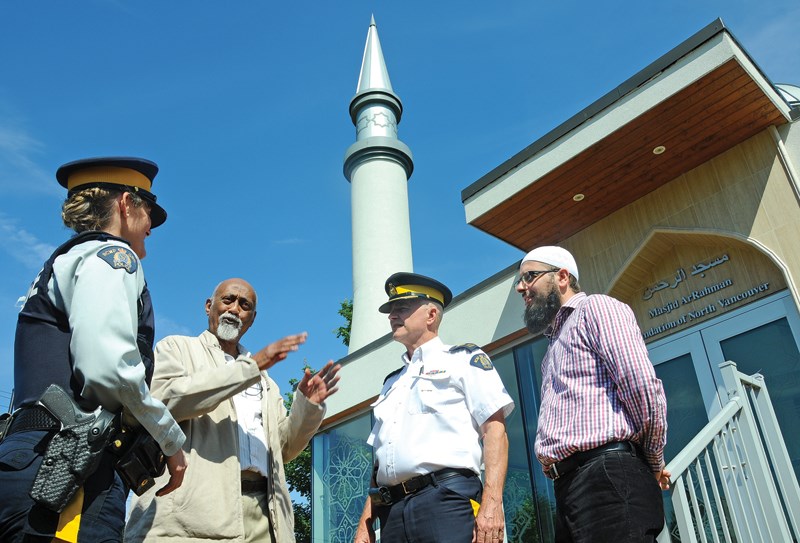Ali Amedi remembers well the night someone threatened to bomb his community’s mosque. The director of the Al Ghadir Islamic Center on Lynn Avenue had invited a guest speaker to address the congregation for evening prayers on Dec. 30, 2013. But around 6 p.m., someone called in a bomb threat.
Amedi called 911. All of the members were ushered outside. The RCMP arrived with bomb-sniffing dogs. They eventually determined there was no bomb, and the suspect was never found.
It was about the only interaction the Islamic Centre, which largely serves the North Shore’s Persian community, had had with the RCMP.
“In our culture, we are always frightened of the police,” Amedi said. “In civilized countries, they are not afraid of the police.”
It’s the kind of thing the RCMP is now trying to turn around, having appointed an officer as liaison to the North Shore’s four mosques and 10,000-plus Muslims.
Cpl. Peri Mainwaring pitched the idea to her superiors and took on the role in December last year. She emailed the leaders of the local mosques and found a warm reception at all of them. The feeling was mutual, according Imam Petrit Decani of the Masjid Ar Rahman mosque in North Vancouver’s Norgate neighbourhood.
“It was a good first meeting, breaking the ice and breaking barriers, you could say, to build trust and understanding – just reaching out. That provided a lot of reassurance, especially with the events going on around the world,” he said. “The community appreciated that.”
But before she’d had her second meeting with a congregation in January, a white supremacist and member of the alt-right walked into the Islamic Cultural Centre of Quebec City and opened fire. He is now charged with murdering six people and injuring 19. The impacts were felt locally.
“I went in and a lot of people were really worried. Only about 20 or 30 people showed up to the prayer service that night. The director there … said ‘Nobody’s here. I’m very sorry.
Everyone’s terrified to come to the mosque after what happened in Quebec,’” she said.
There are also less serious but still disturbing incidents – hate calls and incidents in which women in hijabs face harassment on the street.
“A lot of them approach me and say ‘I’m so glad you’re here. I’m so glad the police know about us. I’m so glad the police are aware about what goes on and we feel supported now,’” Mainwaring said. “It’s been really amazing for me as a person. I didn’t realize how fearful people were in the mosques, that they feel that they’re isolated and if they’re identified as Muslims, some people are targeting them. … If I can help alleviate that, that’s what my job is.”
Mainwaring said she has found personal reward in the assignment and so she now reacts to incidents of Islamophobia on a personal level, as well.
“I’m so lucky that I’ve had these last eight months. I’m still a beginner but I know more about Islam than I ever did and I have a better understanding of what Islam is and I’ve met the people and the groups,” she said. “It gets me inside too. It’s not just the job for me.”
Whenever there is an incident of terrorism aboard, local Muslims brace for more intolerance but Amedi said it comes from people who fail to understand what people believe, and do and preach in local mosques.
“That is not Islam. That is radicalism. That is people attaching themselves to Islam, which Islam does not agree with. In Islam we believe killing one person means killing everybody. If people are keeping silent, they are part of the crime as well,” he said.
Part of Mainwaring’s job is also to be a point of contact if anyone in the local Muslim community feels worried one of their members is becoming radicalized.
Decani said he’s never experienced those worries first-hand but he and his members are on board and ready, should that happen.
“It’s something we should be aware about and be in touch with the RCMP,” he said. “At the end of the day, it’s to keep the general community safe, Muslim and non-Muslim – everybody. We all have that in mind,” he said.
Local Muslims and imams also appreciate that Mainwaring chooses to observe mosque customs by wearing a headscarf, removing her shoes and bringing a male associate if she’s going to be meeting with the imam alone.
“It’s difficult because it’s not my belief but it’s respectful. I would hope someone would respect me if I had a particular belief as well,” she said. “I said ‘This is your house. This is your place of worship.’ I can be respectful and that doesn’t cost me a lot.”
The attempt to build a relationship with the local Islamic community appears to be working. During the recent Ramadan feast, Mainwaring popped in to Al Ghadir Islamic Center to wish the members well. Amedi invited her to stay and join the feast. At first she protested because she’d already had dinner, but eventually she was persuaded. Amedi said she was one of the last to leave, talking and laughing with women in the mosque until late at night. It’s the kind of relationship Amedi wishes the wider community knew they could have with their Muslim neighbours.
“We are open to everybody,” he said. “We respect everybody and we expect respect from everybody as well. What we don’t like about ourselves is what we don’t like about others.”



